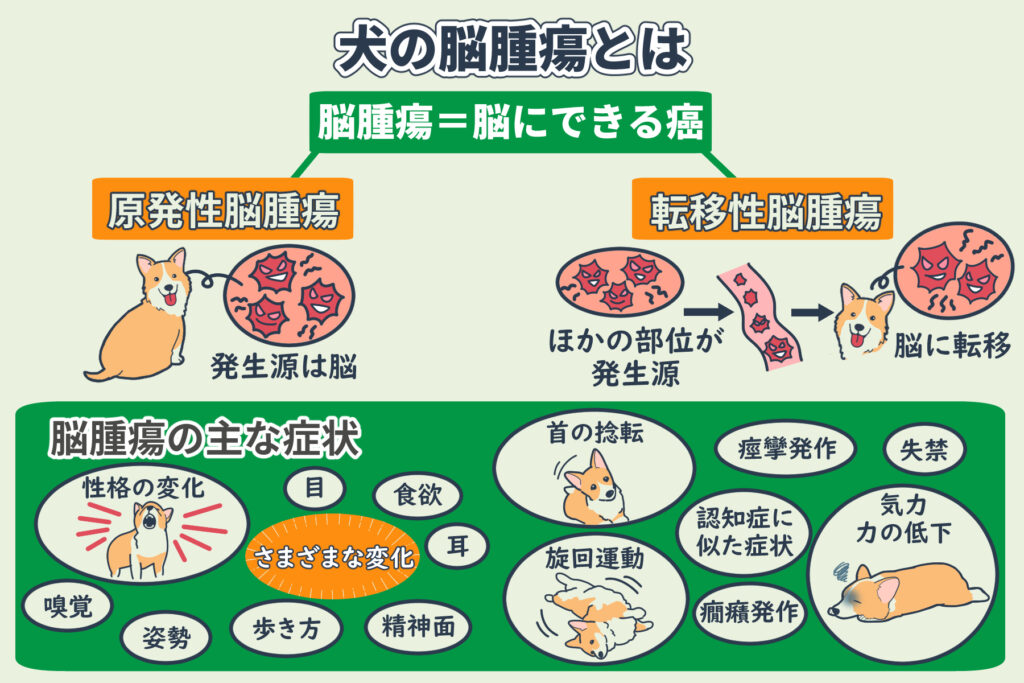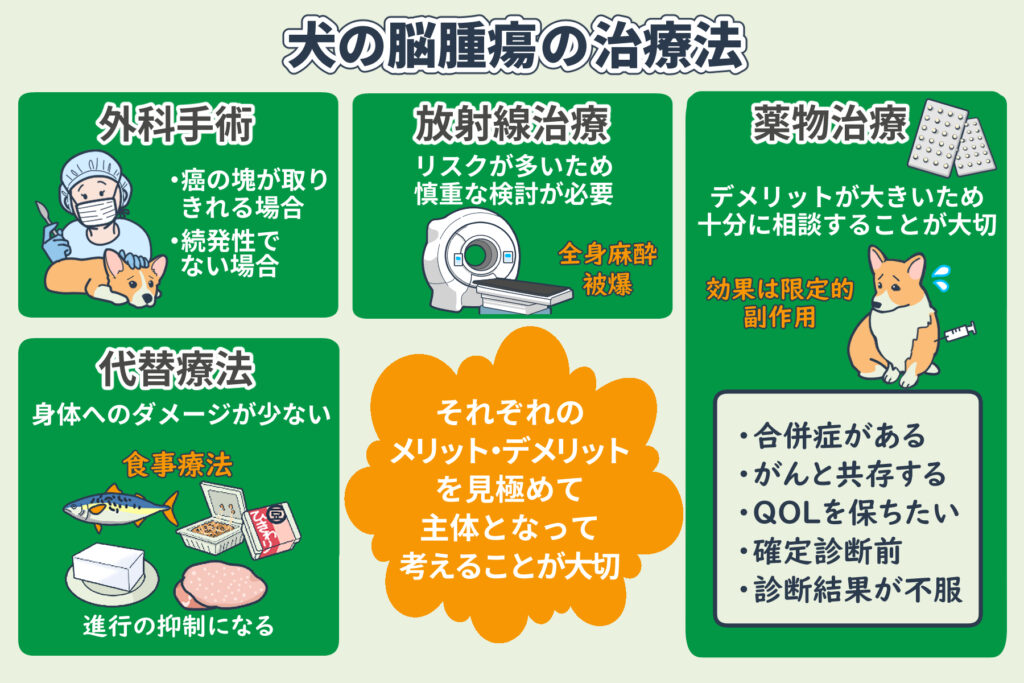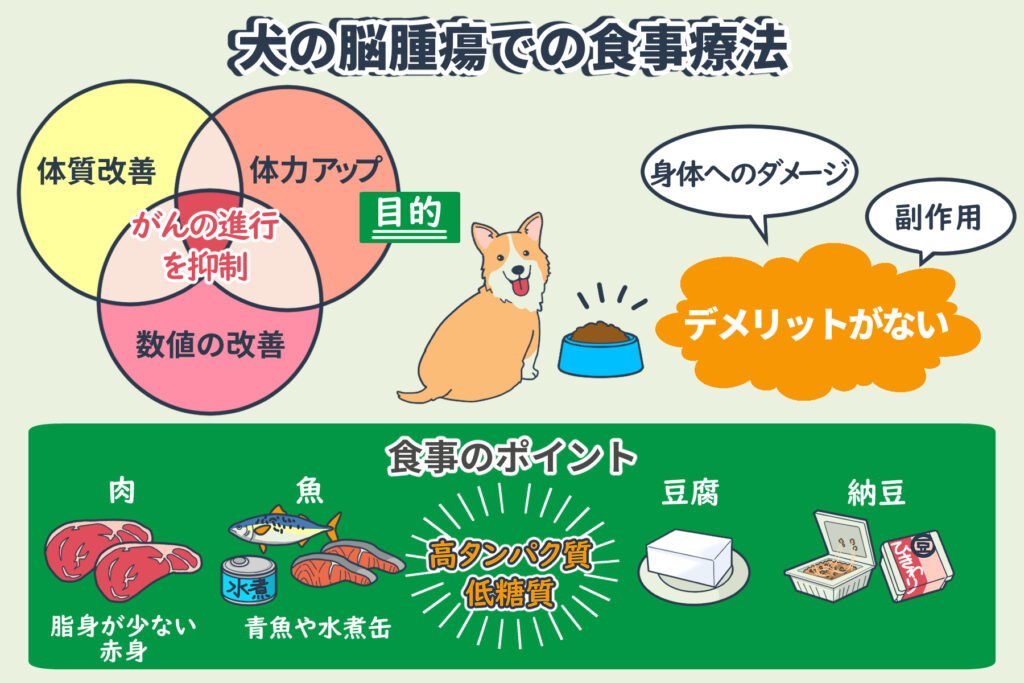- It is difficult to diagnose a brain tumor based solely on a dog’s symptoms.
- There are four treatment options for brain tumors in dogs: “Surgery,” “Radiation Therapy,” “Medication,” and “Alternative Therapies.”
- It is uncertain whether a complete cure can be achieved, but there is a good chance that the dog’s appetite and vitality can be restored.
目次
- 1 For Those Whose Dogs Have Been Diagnosed with a Brain Tumor
- 2 What is a Brain Tumor in Dogs?
- 3 Causes of Brain Tumors in Dogs
- 4 Diagnosis of Brain Tumors in Dogs
- 5 Treatment of Brain Tumors in Dogs
- 6 Alternative Therapies for Brain Tumors
- 7 What You Can Do at Home—Dietary Therapy
- 8 Immune Support is Crucial for Brain Tumor Management
For Those Whose Dogs Have Been Diagnosed with a Brain Tumor
Even if your dog has been diagnosed with a brain tumor, we want you to know that, depending on the approach, it is possible to coexist with or overcome the tumor.
This information is intended to be helpful for those who are about to start treatment, those who are currently undergoing treatment, and those who have been told that treatment is no longer possible.
What is a Brain Tumor in Dogs?

A brain tumor is cancer that occurs in the brain, and there are various types.
There are primary brain tumors, which originate in the brain, and metastatic (or secondary) brain tumors, which occur when cancers from other parts of the body such as lung cancer, mammary gland tumors (mammary tumors), or malignant lymphoma metastasize to the brain.
Melanoma (malignant melanoma) and hemangiosarcoma also metastasize to the brain.
The symptoms vary depending on which part of the brain the cancer affects.
It is difficult to diagnose a brain tumor based solely on a dog’s symptoms, but if you notice any unusual behavior, it is recommended to consult a veterinarian as soon as possible.
Symptoms of Brain Tumors in Dogs
The symptoms that appear when a dog has a brain tumor vary depending on the part of the brain affected, but the following symptoms are often observed:
- Seizures: Symptoms similar to epileptic seizures
- Mental and behavioral changes: Becoming irritable, timid, or suddenly starting to bark
- Eye changes: Unfocused vision, decreased vision, strabismus, nystagmus (involuntary eye movement), etc.
- Neck twisting: Torticollis, where the neck remains twisted due to poor balance
- Circling motions: Walking in circles, inability to walk, or difficulty going up and down stairs
- Changes in posture and walking: Walking with a tilt to one direction, staggering gait
- Changes in appetite: Sudden loss of appetite or increased appetite
- Lethargy
- Weakness
- Reduced hearing: Poor response to voices and sounds
- Incontinence: Inability to control urination
- Decreased sense of smell
- Symptoms resembling dementia
Causes of Brain Tumors in Dogs
Most brain tumors in dogs are primary brain tumors.
- Meningioma
- Glioma
- Undifferentiated sarcoma
- Pituitary tumor
- Glial cell tumor
Metastatic brain tumors (secondary brain tumors) can be caused by the metastasis of hemangiosarcoma, lymphoma, lung cancer, mammary tumors (breast cancer), melanoma, etc.
Both primary and metastatic brain tumors tend to occur more frequently in older dogs.
It is said that brachycephalic breeds such as Golden Retrievers, Dobermans, Boston Terriers, and English Bulldogs are more prone to brain tumors compared to other breeds.
Causes of Primary Lung Cancer and Lung Tumors
The exact cause of primary brain tumors is not well understood.
The fact that incidence rates differ between breeds suggests that there may be some genetic factors involved.
Additionally, exposure to cigarette smoke (from smokers in the household) could also be a potential cause.
It is recommended for those who live with dogs to be mindful of smoking locations.
Poor blood circulation and hypothermia can also increase the risk of cancer, so make sure to keep your dog warm.
Diagnosis of Brain Tumors in Dogs
The following methods can be used for examination:
- Observation of symptoms
- Neurological examination
- Cerebrospinal fluid examination
- MRI
- CT scan
As previously mentioned, even if there is a tumor (cancer) in the brain, symptoms usually do not appear in the early stages.
As cancer progresses to some extent, various symptoms appear depending on the location where the cancer has developed. It’s not uncommon for the cancer to already be in an advanced stage by the time you notice it.
It’s recommended to observe your dog’s behavior and condition regularly, and if their demeanor seems off for several consecutive days, you should consult a veterinarian.
However, MRI and CT scans are costly and may require the administration of sedatives or other medications during the procedure. Therefore, it’s essential to thoroughly discuss with your veterinarian whether these tests are truly necessary.
Treatment of Brain Tumors in Dogs

The treatments for brain tumors include the following:
- Surgery
- Radiation Therapy
- Drug Therapy (including chemotherapy and steroids)
- Alternative Therapies
Surgery for Brain Tumors in Dogs
The possibility of a complete cure for a brain tumor is when the cancer can be completely removed through surgery.
If the cancer forms a mass without infiltrating the surrounding tissues, there is a possibility of long-term survival post-surgery, making surgery a worthwhile consideration.
While surgery may be performed to alleviate symptoms, in most cases, it is not considered an appropriate option.
Radiation Therapy for Brain Tumors in Dogs
Radiation therapy can be used in conjunction with surgery or as a standalone treatment.
However, responses to radiation vary among individuals, and the treatment requires general anesthesia, which imposes a burden on the body.
In elderly dogs or those with lung diseases, the risks of anesthesia are higher, necessitating careful judgment.
Furthermore, due to the issue of radiation exposure, repeated treatments are not feasible.
Chemotherapy for Brain Tumors in Dogs
Chemotherapy can be used to treat brain tumors in dogs.
However, because the brain has a barrier known as the blood-brain barrier, which is difficult for chemotherapy drugs to pass through, the effectiveness is limited.
Given the potential side effects, it is highly recommended to have a thorough discussion with your veterinarian to decide whether chemotherapy is the best option.
If chemotherapy is suggested, please refer to the following articles:
Ensure that undergoing chemotherapy will indeed improve your dog’s prognosis and not simply increase suffering due to side effects.
If it is said that the goal of chemotherapy is to prevent the progression of the brain tumor, inquire further, there will be no suffering from side effects that degrade the quality of life (QoL), correct?
- About Chemotherapy Drugs Used in the Treatment of Cancer in Dogs and Cats – Side Effects and Precautions
- About Targeted Cancer Therapies Used in the Treatment of Cancer in Dogs and Cats
- Types and Protocols of Chemotherapy Drugs Used in the Treatment of Lymphoma in Dogs and Cats
- Pet Cancer Treatment and Risks of Low-Level Exposure to Chemotherapy Drugs
- Reasons Why 90% of Chemotherapy Drugs Cause Side Effects
- Considering Chemotherapy for Your Dog or Cat: What Are the Risks of Side Effects?
If you decide to proceed with chemotherapy, utilizing Cordy for Immune Support and Placenta Extract from Domestic SPF Pork for Liver and Kidney Care can help manage side effects and potentially improve the quality of life (QoL).
Important Considerations When Treating Brain Tumors
Both surgery, chemotherapy, and radiation therapy have their own benefits and drawbacks.
You, as the owner, are the ones who best understand the condition of your beloved dog.
Just because a veterinarian recommended treatment, accepting it can sometimes make your pet’s condition worse or increase their suffering.
To avoid such situations, it is important for owners to take the lead and decide whether to pursue, forego, or pause treatment for the sake of their beloved dog.
Alternative Therapies for Brain Tumors
The fact that they cause less damage to the body means they can be used regardless of the stage or condition of the disease. They can also be used before surgery, to prevent recurrence after surgery, in cases where surgery is not possible, and even when physical strength is diminished.
Especially in the following situations, considering alternative therapies could be highly beneficial:
- When there are complications, and the risks of general treatments are high
- When aiming for coexistence with cancer
- When prioritizing the avoidance of QOL reduction
- Before a definitive diagnosis is made
- When the diagnosis doesn’t seem satisfactory
You can use alternative therapies in parallel with hospital treatments (such as surgery, radiation, and chemotherapy), and you can expect synergistic effects. Therefore, please actively consider alternative therapies.
What You Can Do at Home—Dietary Therapy

Meals are a daily routine that constitute not only the bodies of humans but also of our dogs.
Review your daily meals to ensure your dog’s body can maintain its immune system.
The objectives of dietary therapy are to slow down cancer growth, build strength, and improve anemia and albumin levels.
Our company places great importance on a nutritional approach as the basis of treatment.
Cancer needs carbohydrates (glucose) to grow.
Limiting carbohydrates as much as possible can be started immediately, imposes no burden on the body, and has no risk of side effects.
However, dietary therapy cannot be carried out without the cooperation of all family members at home.
Provide ample protein such as fish, meat, tofu, and natto, and reduce the amount of food high in carbohydrates and sugars.
While changing the diet alone will not cure cancer, restricting the glucose essential for brain tumor growth can slow its progression. Although this requires more time and effort than just providing food, we hope you can start without too much difficulty.
Diet for Dogs with Brain Tumors
Since preparing meals can be laborious and unsustainable if too burdensome, we have created a list of ingredients to help ease the workload.
Please take a moment to read it.
Even Pets Follow the Principle of “Food as Medicine”—Ingredients to Combat Cancer
Immune Support is Crucial for Brain Tumor Management
When your dog is suffering from a brain tumor, it is crucial to support their immune system regardless of whether they undergo surgery, radiation therapy, or chemotherapy.
At Cordy Research Lab, we study how Cordy affects the immune system.
While we cannot guarantee a cure, there is a good chance that your dog will regain appetite and energy.
Our research lab is investigating whether Cordy administration can modulate immunity and its potential effects on cancer.
If you have any questions, please contact us.
監修獣医師:林美彩 所属クリニック:chicoどうぶつ診療所

代替療法と西洋医学、両方の動物病院での勤務経験と多数のコルディの臨床経験をもつ。 モノリス在籍時には、一般的な動物医療(西洋医学)だけでは対応が困難な症例に対して多くの相談を受け、免疫の大切さを痛烈に実感する。
ペットたちの健康維持・改善のためには薬に頼った対処療法だけではなく、「普段の生活環境や食事を見直し、自宅でさまざまなケアを取り入れることで免疫力を維持し、病気にならない体づくりを目指していくことが大切である」という考えを提唱し普及活動に従事している。
所属:






